Over the years, you’ve probably heard about real estate investing and the elusive real estate mogul. While investing in hard real estate has significant advantages and money-making opportunities, so does investing in real estate notes.
So, what’s the different between the two? And is there an advantage of one over the other?
What Are Real Estate Notes?
When a buyer purchases a home, traditionally they go to a bank to obtain a home loan. The bank then pays the seller on their behalf.
But, there is a way to cut out the middleman.
With Seller Financing, also known as ‘owner financing,’ the seller allows the buyer to make monthly payments directly to them, instead of to a bank. Mainly, the seller trades receiving a lump sum up front for future, monthly payments with interest.
How Does Note Investing Work?
Once a seller owner finances their home, the terms of the agreement are set in stone. But, that doesn’t mean they are stuck with their privately funded mortgage note.
In most cases, at any point, they can sell it.
Enter the note investor.
A note investor will purchase the seller-financed note, taking over the responsibility of collecting payments and managing the transaction while also becoming the new recipient of the monthly payments.
It’s like being a landlord, without all the hassle and responsibility.

The Difference Between Real Estate Investing and Note Investing
It all comes down to what the investor owns and doesn’t own.
With real estate investing, the investor purchases the actual property. In note investing, the investor purchases future payments on a mortgage note.
Only if the payor defaults and the foreclosure process is completed will a note investor own the actual property.
So, Which One is Better?
Passive Income
With note investing, you get all of the income with none of the responsibility of being the property owner. Beyond collecting monthly payments, you are not responsible for items such as taxes, insurance, landscaping, or a new roof.
No emergency phone calls because the plumbing isn’t working. No having to deal with unwanted extra roommates. No re-signing yearly or monthly leases.
It’s genuinely a passive income.
Profitability
With terms that span years and decades instead of months, your income will not suddenly drop off when the economy inevitably talks a nose dive.
On top of that, seller financed notes have advantages in all types of markets.
When housing prices are high, they offer property ownership solutions for buyers that may have troubles getting approved by banks. In a down market, less marketable properties’ like mobile homes, lower income areas and larger plots of land are not excluded from the market.
Versatility
With real estate investing, you have options of what type of real estate to invest in: apartments, townhomes, entire neighborhoods, etc.
But, that’s the end of the flexibility.
With note investing, you can purchase various types of mortgage notes in lots of different ways.
Maybe you want to sell only a part of your note. Or you want to buy just performing notes or just non-performing notes. Perhaps your goal is it help turn lower income rentals into affordable homes that can help a tenant turn into a home owner.
Note investing offers versatility that is hard to find in other investments.
